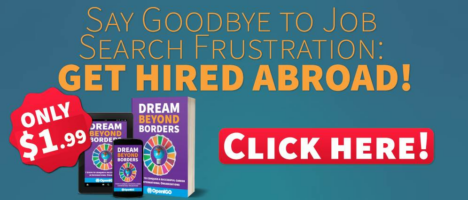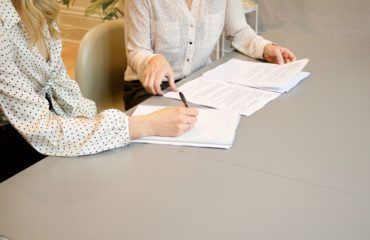Estimated reading time: 12 minutes

Sara Hassen is a 25-years old Egyptian lady with a brilliant academic background in Computer Science. With a PhD from the University of Birmingham in the UK, Sara was our customer in 2019 when she applied for the World Bank’s Young Professional Program. Having made it to the final stage of this competitive selection process, she agreed to share with us tips about the World Bank YPP Interview Questions and Assessment Center for helping future candidates.
If you want to know more about this recruitment initiative and what it feels to go through it, keep reading! A special “thank you” to Sara for her time and cooperation.
In pursuit of its mission, the OpenIGO network has prepared a comprehensive eBook and support and guidance services with the aim of highly increasing your chances of success in this competitive process. Our comprehensive eBook will introduce you to the complex world of the World Bank Group and its approach towards international development; it will teach you how to prepare each of the documents required in detail, and will also get you ready for the interview and assessment center. This eBook was written and revised by a team of professors, human resources specialists and former young professionals with a great deal of diligence.
In addition, we have developed support and guidance services. These services include a mock interview as per the World Bank YPP model. Having a mock interview with a professional who has extensive experience and knowledge of the World Bank YPP interview model will help you be better prepared for this phase, greatly increasing your chances of being selected for the desired vacancy.
Discover our WBG YPP – Interview Preparation
Also, check out our overview of the job opportunities at the World Bank:
- Sara, how did you come to know about the WB YPP and why did you decide to apply?
“I came to know about it mainly through “word-of-mouth” and I decided to apply mainly because I’d had an academic setting for quite a long time and I think that there’s usually a gap between the academia and the industry and I found the YPP to be a good opportunity to ‘bridge’ this gap and put my knowledge to practice.”
- You made it to the interview stage, correct? Off all stages, which one do you think it was the most challenging?
“I think the assessment center was the most challenging one for me.”
- How would you describe the assessment center experience to a candidate that has absolutely no idea of what that is?
“To me, the best way to describe the assessment center is a “marathon”. You are basically in a room for 4 hours doing tasks back-to-back and there’s a 10-minute break right in the middle of the 4 hours. Some of the tasks are individual, some of them are group tasks and you are constantly going from one task to another.”
- What kind of tasks are you assigned during the assessment center?
“Well, in the beginning you are given a profile on a hypothetical country. This profile includes information about the country itself, its context, its region, the problems and opportunities that they have. If I remember correctly, it was a 15 to 20-page profile and you are given a limited amount of time to read through it, as well as a series of individual and group tasks to do. In the beginning, for example, I was given an individual task in order to come up with a list of advices that a representative of the Bank would give to an Official of that country. And then, the next task was a group one where I had to come together with the rest of my colleagues – the candidates I was put together in the room with –, revisit our personal lists of advices and come up with a singular one – according to priority and the different groups/types of advice that we were asked to give. This was a long task: the discussion lasted for about 1 hour and we had 20 minutes to present it. After that, we were given another individual task that lasted for 14 minutes. For this one, we had to come up with some notes in order to give advice to a Finance Minister of a hypothetical country and then we moved on to the group task where we had to merge our individual advices into a single and comprehensive list of notes. Finally, the ‘target’ of those notes came into the room and we had to give a 30-minute presentation, all of us, to the audience on what the notes included. We then had a series of follow-up question that we had to address.”
- What kind of people did you meet during the assessment center? Was everybody willing to work in a team? How was the environment?
“The environment was great! And I think one of the best parts of the experience was actually the environment. Even if you don’t proceed anywhere further from that stage, I think it’s still very much worth being in that environment for that day. Because, basically the way it works is that you are put together with other candidates – in my day we were twelve candidates from all over the world and with so many different backgrounds. I think I was the only one being interviewed for the Digital Development Unit. And you basically go through the entire day together – we were assigned one area for us to stay during the day and I got to share some of my experiences with them. You alternate the interview times and the assessment center times, so there is a chance to get a feeling of what to expect, but we are told in the very beginning of the day that we shouldn’t tell other candidates any specifics about the assignment nor the interview.
Since I had my assessment center in the afternoon, by the time we reached that point we had already spent more than half a day together so it was quite ‘chill’, everyone was willing to work together! At the end of the day, we knew that we were not going to be assessed based only on how much we knew, but also on how well we could work together. In the assessment center room, there were two observers the whole time looking at how we were interacting with each other. So, we knew that that was part of what we were being assessed for and were all willing to put together the effort to work in a team. I didn’t feel like there was a lot of competition nor people trying to over speak each other.”
Do you want to know everything about the WBG YPP interview methods? Then check out our magazine on the topic right now:
Discover our WBG YPP – Interview Preparation
World Bank YPP Interview: HireVue Questions, Tips and Testimonials
- So you think having the assessment center in the afternoon benefited you in some kind of way? Would you rather have had the interview after/in the afternoon?
“I think the way it worked was better for me: having the interview in the morning and the assessment center in the afternoon, although I only came to think about that at the very end. I remember that, at the day, at the very beginning, I had very little idea of what the assessment center was about so I was more anxious to get that done first. But now that I look back at it, I feel that it was better to have the assessment center in the afternoon, because by that time I had actually known the people that were going to be assessed with me so it worked more for our benefit. So, I personally think this sequence was better for me.”
- Could you tell us a little bit more about the interview? How was the experience?
“The interview was one-hour long with three panelists. One of them was an ex-Chair. He asked me more of the personal questions: a bit more about my background, why I applied – the typical interview questions. The other two interviewers focused more on situational questions: ‘if you were working in project X, how would this project affect X aspect?’. I remember that one of the questions went something like: ‘if there is a road being built in a specific community how is it going to affect the economic situation of that community?’. I think this question came from the interviewer that was from the Infrastructure Unit.
Another thing worth mentioning is that they do give you hints along the way in order for you to expand further on your answer. If we take this specific road construction example, right after I was done with my answer, they asked me follow-up questions on aspects I hadn’t covered, like ‘don’t you think it might affect the gender-equality issues, as well?’.
They also give you time to pause and put an idea together, as well as to take notes. They were quite cooperative when it came to giving me time to think about my answers, but nonetheless, I felt quite challenged by the nature of the questions, since some of them were quite outside the scope of what I know in the sense that we were talking about units that I didn’t read much on. When I was preparing, I was reading more on the units that might be affected by digital development, but they expanded the questions beyond that. So, I guess the lesson learned from this experience would be to not assume that your unit might be unrelated to one or two other units, because questions about that might come anyway.”
- How was your personal preparation like to take on this final stage of the selection process?
“For the interview, it was more of reading about the different units and, as I said, maybe I should’ve read up more on other units. But it was basically reading up on each of the units in the World Bank’s website so as to know more about their mission, recent projects and plans for the future.
The other part related to the interview preparation was to come up with a set of hypothetical questions that I might be asked (and some of them I was actually asked!). Of course, there are the typical questions that you would expect in every interview such as ‘what is your background?’, ‘why did you apply?’ and so on, but there are also questions related to how you would help in X unit or in X project. So, I prepared these questions as well, for the units I thought were most closely related to digital development. And, lastly, there were also the Annual Reports – from the most recent one, I went back a couple of years and studied them.
For the Assessment Center, since I didn’t know much about what to expect from it in terms of the tasks, I thought the safest way to prepare for it was to read up as many projects as I could – to read at least the abstracts of the projects’ reports that I came across and thought were interesting or were relevant to my background and also relevant to the units were related to Digital Development.”
- Apart from reading more on the other Units, is there something else you would have done differently throughout the selection process?
“The main thing for me, I feel that it was to read up on more units than what I did. Even the ones that even don’t seem relevant at all. But also, to focus less on numbers! For a lot of the units I was reading up about, there were a lot of statistics and numbers in the information given and I was initially under the impression that knowing these numbers and bringing them up in my answers during the interview could actually be a plus point, but I don’t know… perhaps it was a plus point, but I feel that I focused too much on trying to remember these statistics , whereas I should have focused more on linking the different units together and seeing the cause and effect of different issues across different units. I should have focused more on how my thought process is in linking different issues across the different units.”
- Personally, why do you think you were not selected to become a Young Professional? Do you think this had anything to do with the content of your answers during the interview, the fact that you had more of a researcher-profile?
“I think the answer is ‘during the interview’. Although the Assessment Center was the bit, I found more challenging, that was mainly because of its length. But I think that, at the end of the day, which contributed to me not being successful were my answers during the interview. Perhaps my answers should have been ‘broader’ rather than ‘deeper’, because I was thinking about linking everything back to my background, instead of expanding on things beyond my background. I think that could have made a difference.”
- Apart from what is officially stated in the eligibility criteria and from what you have seen from other candidates, what kind of applicant you think is most likely to stand out in this selection process?
“Two things come to mind. The first one is: someone with flexibility in spotting links and spotting causes and effects. The other thing is: being bold in your opinion! In other words: if you think that something is going to have an impact on something else when working on a project, then be assertive about it. Because when that comes across in the interview it does show confidence from your side and this is something I myself could perhaps have done better.”
- What has changed in your professional life/career since this experience? What have you learned from it?
“Well, I guess I could say that I learned not to make any assumptions about interviews! (laughs) And not to assume that anything is relevant. As for my professional life: after the WB YPP selection process, I actually got a job in an academic setting which is a step! It’s a research/teaching role – so it’s a step towards ‘industry’ hopefully.”
- What one piece of advice would you give to a candidate that is going to try out the program this year?
“For candidates that are still in the process of preparing their application, I would say that it is as important to read about the World Bank before you write your application essay and don’t wait until you reach the interview stage in order to start reading about the organization. Prepare for writing your essay as if you were preparing for the interview itself.”
- Would you consider applying again?
“Yes! Because the selection process experience itself is rich and very much worth it.”
Do you want to know more about the World Bank YPP? Do you want to become the next World Bank’s Young Professional? We can help! OpenIGO is an extensive network composed of former young professionals, professors and researchers from the best universities in the world, international civil servants and Human Resources specialists.
Discover our WBG YPP – Interview Preparation
OpenIGO overall services are extremely well-rated by those who bought them! These are some of the testimonials we’ve had for our products:
















